You Are Not a Gadget
Jaron Lanier (2011)
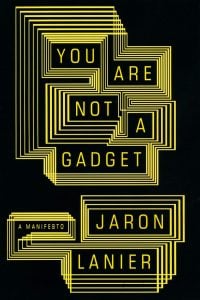 A programmer, musician, and father of virtual reality technology, Jaron Lanier was a pioneer in digital media, and among the first to predict the revolutionary changes it would bring to our commerce and culture. Now, with the Web influencing virtually every aspect of our lives, he offers this provocative critique of how digital design is shaping society, for better and for worse.
A programmer, musician, and father of virtual reality technology, Jaron Lanier was a pioneer in digital media, and among the first to predict the revolutionary changes it would bring to our commerce and culture. Now, with the Web influencing virtually every aspect of our lives, he offers this provocative critique of how digital design is shaping society, for better and for worse.
Informed by Lanier’s experience and expertise as a computer scientist, You Are Not a Gadget discusses the technical and cultural problems that have unwittingly risen from programming choices—such as the nature of user identity—that were “locked-in” at the birth of digital media and considers what a future based on current design philosophies will bring. With the proliferation of social networks, cloud-based data storage systems, and Web 2.0 designs that elevate the “wisdom” of mobs and computer algorithms over the intelligence and wisdom of individuals, his message has never been more urgent.

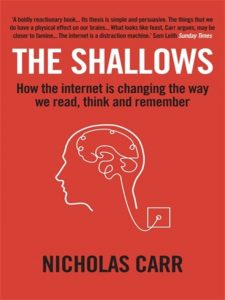 “Is Google making us stupid?” When Nicholas Carr posed that question, in a celebrated Atlantic Monthly cover story, he tapped into a well of anxiety about how the Internet is changing us. He also crystallized one of the most important debates of our time: As we enjoy the Net’s bounties, or are we sacrificing our ability to read and think deeply?
“Is Google making us stupid?” When Nicholas Carr posed that question, in a celebrated Atlantic Monthly cover story, he tapped into a well of anxiety about how the Internet is changing us. He also crystallized one of the most important debates of our time: As we enjoy the Net’s bounties, or are we sacrificing our ability to read and think deeply?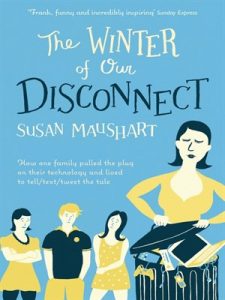 For any parent who’s ever IM-ed their child to the dinner table – or yanked the modem from its socket in a show of primal parental rage – this account of one family’s self-imposed exile from the Information Age will leave you ROFLing with recognition. But it will also challenge you to take stock of your own family connections, to create a media ecology that encourages kids – and parents – to thrive.
For any parent who’s ever IM-ed their child to the dinner table – or yanked the modem from its socket in a show of primal parental rage – this account of one family’s self-imposed exile from the Information Age will leave you ROFLing with recognition. But it will also challenge you to take stock of your own family connections, to create a media ecology that encourages kids – and parents – to thrive.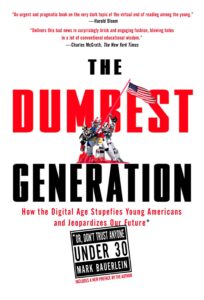 “For decades, concern has been brewing about the dumbed-down popular culture available to young people and the impact it has on their futures. But at the dawn of the digital age, many thought they saw an answer: the internet, email, blogs, and interactive and hyper-realistic video games promised to yield a generation of sharper, more aware, and intellectually sophisticated children. The terms “information superhighway” and “knowledge economy” entered the lexicon, and we assumed that teens would use their knowledge and understanding of technology to set themselves apart as the vanguards of this new digital era.
“For decades, concern has been brewing about the dumbed-down popular culture available to young people and the impact it has on their futures. But at the dawn of the digital age, many thought they saw an answer: the internet, email, blogs, and interactive and hyper-realistic video games promised to yield a generation of sharper, more aware, and intellectually sophisticated children. The terms “information superhighway” and “knowledge economy” entered the lexicon, and we assumed that teens would use their knowledge and understanding of technology to set themselves apart as the vanguards of this new digital era. James Bamford has been the preeminent expert on the National Security Agency since his reporting revealed the agency’s existence in the 1980s. Now Bamford describes the transformation of the NSA since 9/11, as the agency increasingly turns its high-tech ears on the American public.
James Bamford has been the preeminent expert on the National Security Agency since his reporting revealed the agency’s existence in the 1980s. Now Bamford describes the transformation of the NSA since 9/11, as the agency increasingly turns its high-tech ears on the American public. Whistleblower Mark Klein tells the story of the illegal government spying apparatus installed at an AT&T office by the National Security Agency, and his battle to bring it to light and protect Americans’ 4th Amendment rights. After the New York Times revealed in 2005 that the NSA was spying on Americans’ phone calls and e-mail without Constitutionally-required court warrants, the Bush administration openly defended this practice which also violated the Foreign Intelligence Surveillance Act. All details of the highly secret program remained hidden from the public—until Klein came forward. A technician for over 22 years at telecom giant AT&T, Klein was working in the Internet room in San Francisco in 2003 and discovered the NSA was vacuuming everyone’s communications into a secret room, and he had the documents to prove it (sample pages included). He went to the media in 2006, and then became a witness in a lawsuit brought against the company by the Electronic Frontier Foundation.
Whistleblower Mark Klein tells the story of the illegal government spying apparatus installed at an AT&T office by the National Security Agency, and his battle to bring it to light and protect Americans’ 4th Amendment rights. After the New York Times revealed in 2005 that the NSA was spying on Americans’ phone calls and e-mail without Constitutionally-required court warrants, the Bush administration openly defended this practice which also violated the Foreign Intelligence Surveillance Act. All details of the highly secret program remained hidden from the public—until Klein came forward. A technician for over 22 years at telecom giant AT&T, Klein was working in the Internet room in San Francisco in 2003 and discovered the NSA was vacuuming everyone’s communications into a secret room, and he had the documents to prove it (sample pages included). He went to the media in 2006, and then became a witness in a lawsuit brought against the company by the Electronic Frontier Foundation.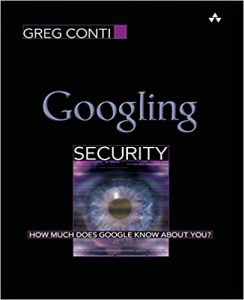 What Does Google Know about You? And Who Are They Telling? When you use Google’s “free” services, you pay, big time-with personal information about yourself. Google is making a fortune on what it knows about you…and you may be shocked by just how much Google does know. Googling Security is the first book to reveal how Google’s vast information stockpiles could be used against you or your business-and what you can do to protect yourself. Unlike other books on Google hacking, this book covers information you disclose when using all of Google’s top applications, not just what savvy users can retrieve via Google’s search results.
What Does Google Know about You? And Who Are They Telling? When you use Google’s “free” services, you pay, big time-with personal information about yourself. Google is making a fortune on what it knows about you…and you may be shocked by just how much Google does know. Googling Security is the first book to reveal how Google’s vast information stockpiles could be used against you or your business-and what you can do to protect yourself. Unlike other books on Google hacking, this book covers information you disclose when using all of Google’s top applications, not just what savvy users can retrieve via Google’s search results.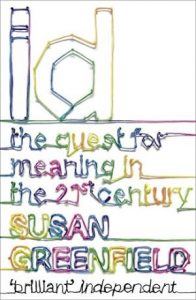 If you’ve ever wondered what effect video games have on your children’s minds or worried about how much private information the government and big companies know about you, ID is essential reading.
If you’ve ever wondered what effect video games have on your children’s minds or worried about how much private information the government and big companies know about you, ID is essential reading.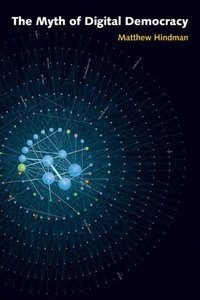 Is the Internet democratizing American politics? Do political Web sites and blogs mobilize inactive citizens and make the public sphere more inclusive? The Myth of Digital Democracy reveals that, contrary to popular belief, the Internet has done little to broaden political discourse but in fact empowers a small set of elites–some new, but most familiar.
Is the Internet democratizing American politics? Do political Web sites and blogs mobilize inactive citizens and make the public sphere more inclusive? The Myth of Digital Democracy reveals that, contrary to popular belief, the Internet has done little to broaden political discourse but in fact empowers a small set of elites–some new, but most familiar.